In the 2017 Census of Agriculture, the average age of California farmers was 59, slightly higher than the national figure, and the total number of farms in the state had dropped to about 70,500 from 87,900 in 1997. Although California is home to large farms, the majority have fewer than 1,000 acres and generate less than $100,000 in sales. The Census of Agriculture will be taken again next year and may reflect changes from additional challenges such as increased labor costs, water scarcity and environmental regulations.
Two of the earliest hurdles for new farmers are accessing land and capital. “With each passing year it gets harder and harder to find good farmland,” said Shermain Hardesty, a retired UC Davis extension economist who worked with small farms. She said new farmers often fall into one of three categories: recent college graduates, immigrants and former farmworkers, and people looking for a second (or third) career. Some rely on savings while others benefit from new farmer loan programs (some examples below). Over the years, she said the number of people interested in starting farms “hasn’t really changed.”
These short profiles feature some of California’s next generation of farmers.
The only two jobs Sebastian Guillen has ever done are farm work and coaching baseball. The sport took him to Iowa, but throughout high school and college, he spent his summers in the field.
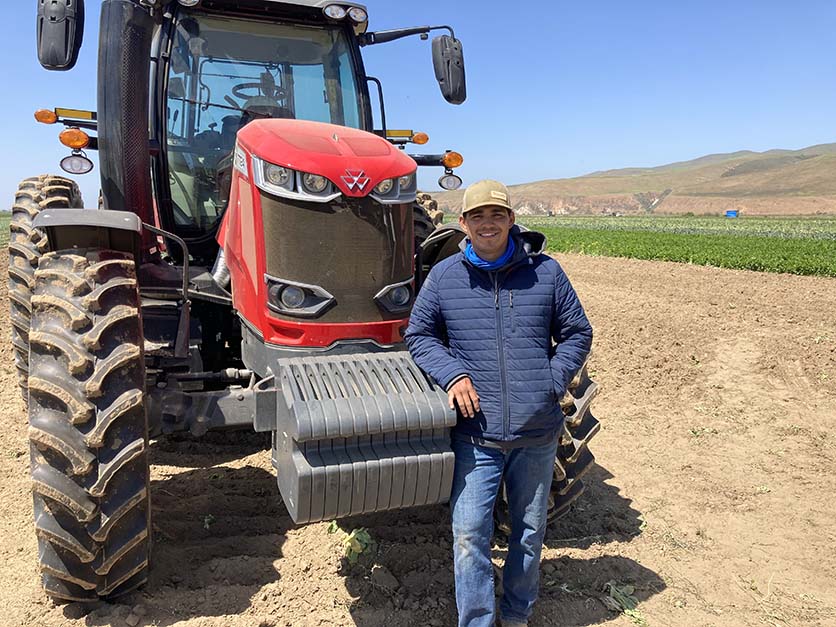
Sebastian Guillen, organic produce, Santa Maria
“I just knew that eventually I was going to come back home,” he said. Now he’s managing most of the vegetables on the organic farm he operates with his dad in Santa Maria. They grow berries and other produce for Coke Farms, an organic distributor in San Juan Bautista. Now in his second year working full time on the farm, Guillen has added additional crops so he has something to harvest every month. “For May, I had celery and I’ll probably have some baby bok choy.” He also grows broccoli, cabbage and peppers.
The farm was Guillen’s father’s dream, and he started it half a decade ago with a loan from a local bank that supports small farms. It’s now 80 acres and Guillen says his generation – he has two brothers – will likely run it someday. But they’ll each have to find a niche, as he’s trying to do with vegetables. The biggest challenge he’s facing right now is finding more organic land to rent.
“I don’t have anywhere to go after what I have (rented),” he said. Another challenge has been learning the financial aspects of the business, which he wasn’t exposed to as a summer worker.
So far, he hasn’t tapped USDA or other beginning farmer programs, but he’s keeping his eyes open.
“If a program will help me out in some way, shape or form,” he said, “my dad will probably want me to do it.”
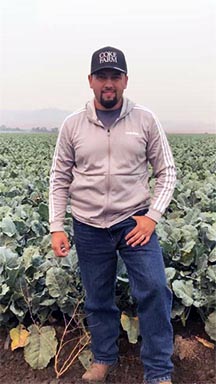
Adrian Bravo, organic produce, Salinas
If all goes as currently planned, Adrian Bravo will start leasing land for his own farm in October. He’s currently working two jobs in quality assurance to save money while he completes a farmer education course through the Agriculture and Land-Based Training Association (ALBA). But he says he threw away his work boots a few times as a young adult, thinking he didn’t want to do manual labor. He tried being a tax advisor, a dispatcher and other desk jobs, but “agriculture always seemed to find a way back to me.”
His uncles and grandfather faced a lot of challenges farming in Mexico. “My grandpa, he tells me to get away from farming, to go do something else.”
But ultimately the combination of working with his hands, seeing brightly colored plants growing, staying in the Salinas Valley and being part of the next generation of organic farmers in California won him over. When he finishes the farmer education course in October, he hopes to start his own farm business. ALBA offers subsidized leases for land and equipment with the expectation that after five years farmers will establish themselves and be able to rent land at market rates. Through his work doing quality assurance for Coke Farms, Bravo has grown aware of the need for people in their 20s, like him, to prepare to fill gaps that older organic farmers will leave as they retire.
“They’re looking for that next wave of farmers to come in,” he said. His experience at Coke and his degree in business from California State University Monterey Bay have also given him the background to consider starting a cross-border distribution business to help Mexican growers reach bigger markets and keep U.S. customers fulfilled year-round. He knows that agriculture south of the border is different than it is for him.
“Most of my family is in Mexico,” he said, “they farm to live.”
He’s farming to help others, feed his community and nurture a long-term dream.
“I want to be a dragonfruit farmer,” he said.
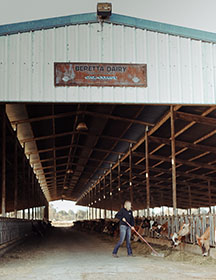
Jennifer Beretta Dairy
At California State University, Chico, Sonoma County Farm Bureau president Jennifer Beretta learned the ins and outs of operating an organic dairy. The timing was perfect because her father had recently bought out her grandfather and transitioned the family operation to organic. In 2010, Beretta returned to the farm full time. At first, she used a young, beginning and small farms loan from American Ag Credit (ACC) to start her own beef herd. Ultimately, she joined the dairy operation, though she said she has recommended the AAC program to others. Today, as the assistant herdswoman, one of her jobs is keeping up with the organic paperwork. She also feeds calves, moves irrigation lines, handles artificial insemination and makes daily decisions about the 300 cows they milk.
Beretta says growing up she watched her dad’s involvement with Farm Bureau and saw how the organization advocated for agriculture. In high school, a speech and debate exercise about genetic modification helped solidify her desire to promote farming.
“I knew that I really wanted to be involved in making sure that agriculture had a voice in our county.” She became the president of the county board this year and says the challenges are many.
“I feel like every month there’s some new thing that we’re trying to make sure at least our county, right here, doesn’t regulate us on,” she said.
She’s open to programs that offer new opportunities, such as CDFA’s Alternative Manure Management Program, which recently funded automatic scrapers and a separator that generate compost her dairy can use for bedding. Beretta says she’s also learned how important it is to say yes—to a legislator visiting the farm, for example or to joining a meeting or organization. She would like to someday have her own milking facility. But for now, as she and her brother contemplate the future not only of their home farm but of the dairy in Marin County that their uncles operate, she’s grateful her father has been open about succession planning.
“I’m very fortunate that I have a dad that talks to us about that.”
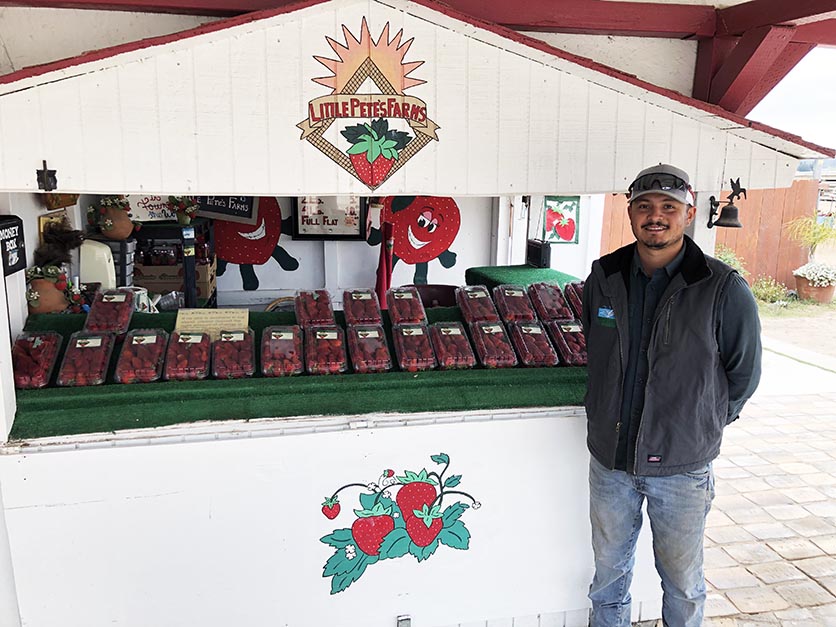
Pedro Cárdenas, produce, Santa Maria
When Pedro Cárdenas was born in 1996, his father built a roadside stand to sell his strawberries and called it Little Pete’s Farms after his son. “I was the baby then,” Cárdenas said, but by the time he was 7 years old, he was greeting customers and running the register. “I learned simple math that way.”
Today, with a degree in ag business from Chico State, he’s in the business full time and working to expand it. He figured out how to adjust planting and harvesting so strawberries could be available year-round and he expanded other produce offerings so the stand no longer closes in winter.
“Let’s try to grow a little bit of everything,” he decided. “Why not?” Now in addition to four types of berries, the stand offers many tomato varieties, herbs, squash, peppers, chilis, broccoli, cauliflower, cabbage and lettuces. “It’s our goal to be like a one-stop place,” he said. Some crops don’t do well. His chili peppers succumbed to pests. But he says whatever happens, he learns something. “(I’ve) always got my notebook with me.”
By the time he was a young teen, Cárdenas knew he wanted to farm and his dad has supported him, and taught him, all along the way. His father emigrated from Mexico when he was young, became a citizen and was farming on his own by the age of 23. In time, he launched two additional businesses, offering irrigation supplies and services. Now that the son has come back to farm full time, he says his father is able to focus more on other enterprises and leave Little Pete’s to… Little Pete.
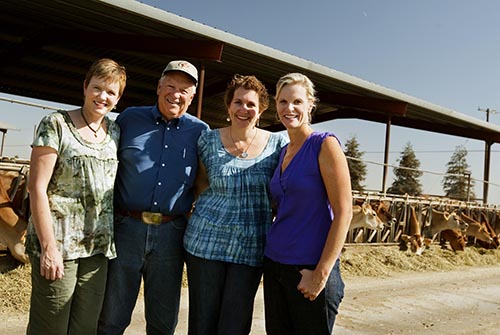
Kimberly Clauss Jorritsma, dairy, Hilmar
Kimberly Clauss Jorritsma and her two sisters operate the dairies that make up the Clauss family’s portion of Hilmar Cheese, which their dad helped found in 1984. Jorritsma manages an operation that milks more than 3300 cows. The biggest challenge, she says, is finding and keeping the 50 or so employees she relies on.
Jorritsma returned to the farm in 1999 after earning a degree from Cal Poly San Louis Obispo and working in Washington, D.C. She considered a career in lobbying, but instead decided to take advantage of her dad’s forward thinking on farm succession.
“He didn’t really know that all three of us would end up on the dairies,” she said, but “he set it up in a way to give us opportunities.”
Her dad was in the first class of the California Ag Leadership Program, and Jorritsma was in the 29th.
She has served on the National Dairy Board and the Merced County Farm Bureau and is currently on the board of American Ag Credit and the Dairy Council of California (where she is a past chairwoman).
While often she’s been the only woman in the room, she says that’s never been a disadvantage.
“I’ve always felt very welcomed,” she said. But over time, what’s become more challenging is being any kind of farmer in California, which she says “hasn’t been a very ag-friendly state.”
Interested in more coverage and insights? Receive a free month of Agri-Pulse West
She has a solar farm and is part of a group exploring CDFA’s Dairy Digester Research and Development Program, which helps fund the design and implementation of systems to capture methane from manure lagoons and repurpose it for renewable energy or biofuel. With water and labor in short supply, she says producing cheese is a lot cheaper in other places. Then again, California has relatively easy access to export markets and over time robotics could reduce her dependence on human labor. But, “for the investment right now,” she said, “I don’t see (robotics) being worth it.”
The next generation could take over from Jorritsma and her sisters. She likes the idea of that, but also knows “it could be challenging here in another 20 years.”
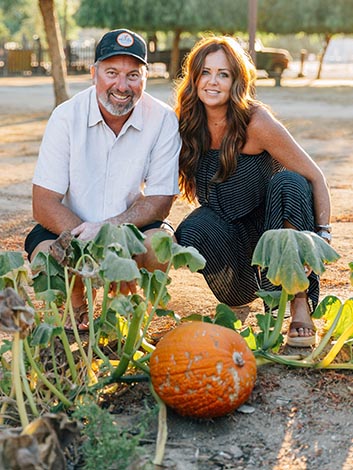
Charlie and Carrie Peltzer, pumpkins, wine grapes, agri-tainment, Temecula
The land where Charlie Peltzer’s family grew oranges became part of the Happiest Place on Earth when his grandfather sold 20 acres in 1950 to a buyer for Walt Disney. But these days, Charlie and his wife, Carrie, offer families a different kind of entertainment.
“We started more of an agri-tainment” business, Carrie Peltzer said, with a pumpkin patch, pony rides, petting farm and pig races.
But 25 years ago, when they first sub-leased land from Charlie’s father in Orange County, they had to start with the basics: water, sewer, electricity. “It was a wing and a prayer,” Charlie said. They had a too-big mortgage on their home and borrowed some money from Carrie’s parents, too. The first 10 years were a struggle, Carrie said. Then in 2006, they moved to Temecula where they manage about 25 acres, with a focus on offering a “day in the country.”
“We’re just trying to do something a little different,” Carrie said.
They planted grapes in 2007 and they’ve been American Ag Credit borrowers for years now, including to finance the winery they added in 2016. The tasting room décor includes the 1926 tractor Charlie’s great-grandfather bought new. They hope eventually to grow Christmas trees, like Charlie’s father. Despite the focus on entertainment, they prefer traditional to trendy—there’s not a bounce house in sight.
Charlie said they wanted to keep things “more agricultural related.” The Peltzers have two sons, a teen and a young adult.
“They’ve both been very, very involved since they could walk,” Carrie said, adding one or both of them may someday take over the multifaceted business. Which is not to say that the parents are ready for that yet.
“We’re definitely not done building,” Carrie said.
For more ag news, go to Agri-Pulse.com.

